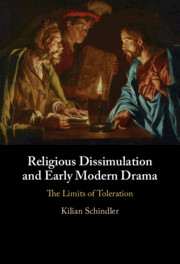Refine search
Actions for selected content:
12 results
3 - Peripheral Heroics on the Renaissance Stage
- from Part I - Early Intimations and Literary Genres: 1500–1800
-
-
- Book:
- The Cambridge Companion to British Literature and Empire
- Published online:
- 20 November 2025
- Print publication:
- 04 December 2025, pp 50-63
-
- Chapter
- Export citation
Chapter 2 - Punishing the Transgressive Will
-
- Book:
- The Will in English Renaissance Drama
- Published online:
- 04 September 2025
- Print publication:
- 18 September 2025, pp 63-99
-
- Chapter
- Export citation
Chapter 3 - Marlowe’s Treasuries
-
- Book:
- Security, Fiscal Policy, and Sovereignty in Renaissance English Literature
- Published online:
- 04 September 2025
- Print publication:
- 18 September 2025, pp 58-91
-
- Chapter
- Export citation
Chapter 6 - Exposing Religious Dissimulation
-
- Book:
- Religious Dissimulation and Early Modern Drama
- Published online:
- 31 August 2023
- Print publication:
- 28 September 2023, pp 160-188
-
- Chapter
-
- You have access
- Open access
- HTML
- Export citation

Religious Dissimulation and Early Modern Drama
- The Limits of Toleration
-
- Published online:
- 31 August 2023
- Print publication:
- 28 September 2023
-
- Book
-
- You have access
- Open access
- Export citation
Chapter 4 - ‘O, what a sympathy of woe is this’
-
- Book:
- Sympathy in Early Modern Literature and Culture
- Published online:
- 27 April 2023
- Print publication:
- 13 April 2023, pp 139-175
-
- Chapter
- Export citation
1 - The Rose Theatre, London, and Stage Movement in Marlowe’s Doctor Faustus
-
- Book:
- Visualising Lost Theatres
- Published online:
- 18 August 2022
- Print publication:
- 25 August 2022, pp 15-37
-
- Chapter
- Export citation
Chapter 1 - Stage Talk
-
- Book:
- The Pursuit of Style in Early Modern Drama
- Published online:
- 26 August 2022
- Print publication:
- 25 August 2022, pp 41-80
-
- Chapter
- Export citation
Chapter 12 - ‘All Their Minds Transfigured So Together’: The Imagination at the Elizabethan Playhouse
- from Part III - Playhouses
-
-
- Book:
- Playing and Playgoing in Early Modern England
- Published online:
- 10 March 2022
- Print publication:
- 17 March 2022, pp 242-261
-
- Chapter
- Export citation
Chapter 9 - A New Made Wound
- from Part III - Pleasures and Ornaments
-
- Book:
- Poetry and Bondage
- Published online:
- 08 October 2021
- Print publication:
- 21 October 2021, pp 283-310
-
- Chapter
- Export citation
Chapter 2 - Marlowe’s Doctor Faustus
-
- Book:
- The Faust Legend
- Published online:
- 02 September 2019
- Print publication:
- 19 September 2019, pp 39-77
-
- Chapter
- Export citation
Conclusion
-
- Book:
- The Afterlife of Shakespeare's Sonnets
- Published online:
- 16 August 2019
- Print publication:
- 29 August 2019, pp 243-250
-
- Chapter
- Export citation
